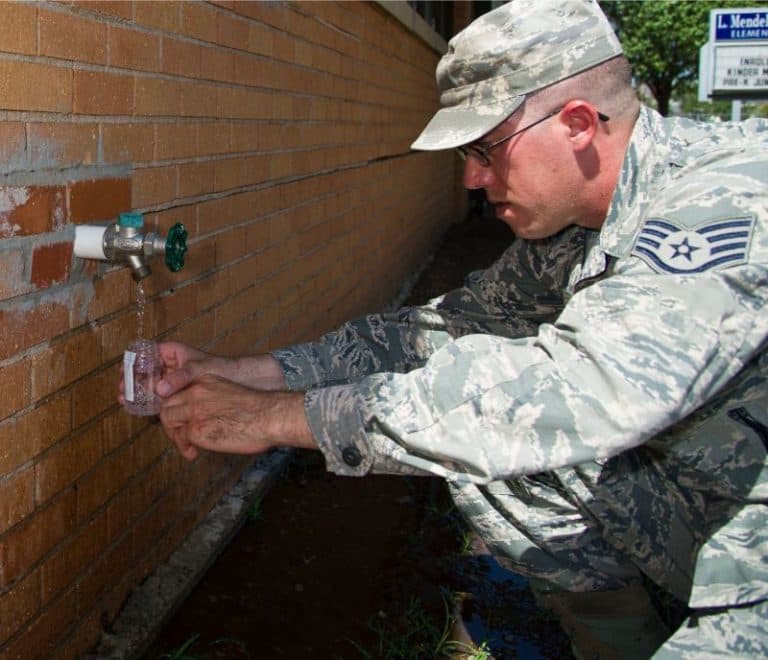Call Us Now

Camp Lejeune Water Contamination
Two of eight water treatment facilities supplying water to the Camp Lejeune Marine Corps Base in North Carolina were contaminated with volatile organic compounds from 1957 through 1987. Those potentially at-risk for developing or illness as a result of the contamination include Marines, Sailors, their families and civilian employees who were on base anytime between 1957 and 1985.
If you or someone you has been affected by the Camp Lejeune water contamination issue, you may be entitled to compensation for past, current and future medical bills, lost wages, loss of quality of life, and much more.
One contact solution is dedicated to fighting for the rights of veterans and their families. Your initial consultation is free and you will not owe us any fees unless we are able to recover financial compensation on your behalf.
Causes of Camp Lejeune Water Contamination
Water from the Tarawa Terrace Treatment Plant and the Hadnot Point Treatment Plant were found to be contaminated primarily by two toxic chemicals.
The Tarawa Terrace Treatment Plant was contaminated by perchloroethylene (PCE), a colorless liquid most commonly used for dry cleaning. The source of this contamination was found to be the waste disposal practices of an off-base dry cleaning company. The PCE levels at the Tarawa Terrace Treatment Plant highly exceeded current standards between November 1957 and February 1987, according to the Agency for Toxic Substances & Disease Registry.
At the Hadnot Point Treatment Plant, the water was contaminated by trichloroethylene (TCE), a volatile anesthetic. Underground storage tank leaks, industrial area spills and water disposal sites are believed to have been the sources of the TCE contamination.
Side Effects of Contaminated Water Exposure
There has been suggestive evidence of a link between extended exposure to PCE or TCE and serious and often fatal diseases, including:
● Liver cancer
● Kidney cancer
● Breast cancer
● Bladder cancer
● Ovarian cancer
● Prostate cancer
● Cervical cancer
● Lung cancer
● Leukemia
● Non-Hodgkin’s lymphoma
● Liver disease
● Miscarriages
● Birth defects
Mercury Found in Camp Lejeune Water
In September 2012, 12 pounds of elemental mercury were found at the Hadnot Point Water Treatment Plant at Camp Lejeune. The water plant was offline for several weeks to clean up the mercury.
Officials believe that the possible source of the mercury contamination was water pressure meters containing elemental mercury that were removed from the plant in the 1980s.
Some common side effects of mercury exposure include:
● Coughing, sore throat
● Nausea, vomiting
● Vision problems
● A metallic taste in the mouth
● Increase in blood pressure
Unfortunately, pregnant women and new mothers can pass mercury on to their unborn and newborn children. Young children are also more likely to become exposed to mercury vapors as they breathe faster and have smaller lungs than adults..
Causes of Camp Lejeune Water Contamination
Camp Lejeune was home to those serving the United States Marine Corps as well as family members who lived on the base. During this time, these people were ingesting and bathing in tap water every day that was contaminated with dangerous chemicals. Years later, these former base residents and their families began to see a development of cancer and other health issues. As more and more information became available, a few red flags were raised in regard to chemical waste disposal and the knowledge of this hazardous act.
Some of those residents who lived on the Camp Lejeune base and drank the contaminated water stated they believed officials knew about the presence of dangerous chemical substances within the tap water. These allegations led to further investigations to determine who in fact was aware of the Camp Lejeune water contamination.
As of August 2012, The Janey Ensminger Act was signed into law by President Obama. This act ensures that the people who have suffered from the Camp Lejeune water contamination are eligible for medical treatment. The Act will apply to approximately 750,000 people who have suffered from medical issues following their stay at Camp Lejeune.
If you or a loved one has lived on the Camp Lejeune base and believes to have suffered from medical complications following ingestion of the tap water, you may be entitled to compensation. Camp Lejeune water contamination continues to plague thousands of individuals across the country and Gordon & Partners is here to help.
Drop us a line! We are here to answer your questions 24/7
